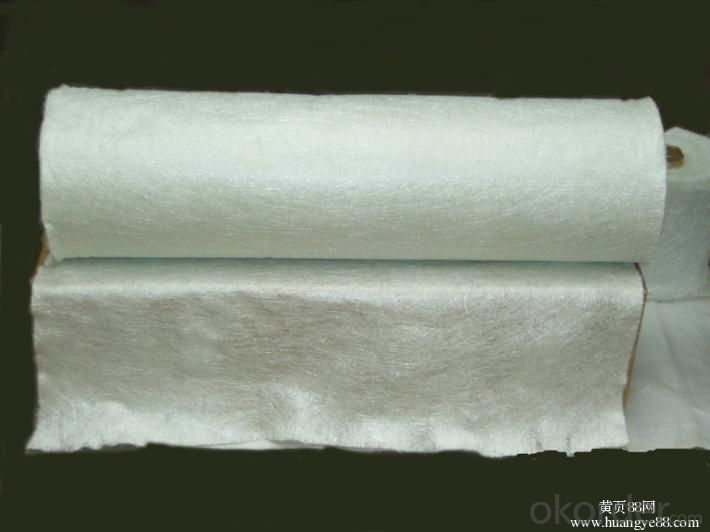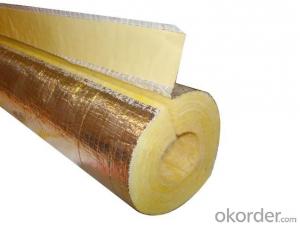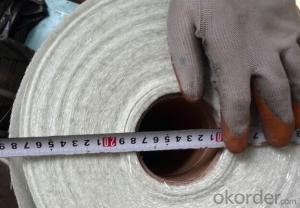E Glass Fiber Stitched Chopped Strand Mat For Tube Manufacturing
- Loading Port:
- Shanghai
- Payment Terms:
- TT OR LC
- Min Order Qty:
- 20000 kg
- Supply Capability:
- 200000 kg/month
OKorder Service Pledge
OKorder Financial Service
You Might Also Like
1.Brief Introduction E-Glass Stitched Chopped Mat for tube manufacturing is made by chopping continuous strands into chopped strands and stitching them together. The product has a maximum width of 110 inches. This product can also be used in manufacturing boat.
2.Product Features
Fast breakdown in styrene
Good wet-through and fast wet-out in resins, rapid air lease
3.Product Specifications
Item | Over Density | Moisture Content | Chop Density | Polyester Yarn | Width |
(g/m2) | (%) | (g/m2) | (g/m2) | (mm) | |
EMK300 | 309.5 | ≤0.15 | 300 | 9.5 | 50-3300 |
EMK380 | 399 | 380 | 19 | ||
EMK450 | 459.5 | 450 | 9.5 | ||
EMK450 | 469 | 450 | 19 | ||
EMC0020 | 620.9 | 601.9 | 19 | ||
EMC0030 | 909.5 | 900 | 9.5 |

4.FAQ
Packaging:
E-Glass Stitched Chopped Strand Mat is wound onto a paper tube which has an inside diameter of 76mm and the mat roll has a diameter of 275mm. The mat roll is wrapped up with plastic film,and then packed in a cardboard box or wrapped up with kraft paper.
Storage:
It is recommended that the room temperature and humidity should be always maintained at 15℃~35℃ and 35%~65% respectively.
- Q:How does the fiber content of fiberglass mat tissue affect its strength?
- The fiber content of fiberglass mat tissue directly affects its strength. A higher fiber content typically results in a stronger fiberglass mat tissue. The fibers provide reinforcement and structural integrity to the tissue, making it more resistant to breaking or tearing. Additionally, a higher fiber content enhances the overall durability and load-bearing capacity of the fiberglass mat tissue.
- Q:How does fiberglass mat tissue perform in terms of moisture absorption?
- Fiberglass mat tissue performs exceptionally well in terms of moisture absorption. Due to its composition of fine fibers, it has a high surface area which enables it to quickly absorb moisture. Additionally, fiberglass mat tissue is hydrophobic, meaning it repels water and does not retain moisture for extended periods. This characteristic makes it an ideal material for applications where moisture resistance is crucial, such as in the construction of waterproofing membranes or in the manufacturing of boats and water tanks. Overall, fiberglass mat tissue demonstrates excellent performance in preventing moisture absorption and maintaining its structural integrity even in wet environments.
- Q:Can fiberglass mat tissue be used in marine applications?
- Yes, fiberglass mat tissue can be used in marine applications. Fiberglass mat tissue is a lightweight and flexible material that is commonly used in boat building and repair. It provides excellent strength and durability, making it suitable for marine environments where the material is exposed to water, salt, and other harsh conditions. Fiberglass mat tissue is often used as a reinforcement layer in the construction of boat hulls, decks, and other structural components. It helps to add strength and stiffness to the composite materials used in marine applications, enhancing their overall performance and longevity. Additionally, fiberglass mat tissue is resistant to corrosion and has good water resistance properties, making it well-suited for marine applications.
- Q:How does fiberglass mat tissue compare to other types of insulation materials?
- Fiberglass mat tissue is a type of insulation material that has its own unique characteristics and advantages when compared to other insulation materials. Firstly, fiberglass mat tissue is known for its excellent thermal insulation properties. It has a low thermal conductivity, meaning it effectively reduces the transfer of heat between the inside and outside of a building. This helps to keep buildings cooler in the summer and warmer in the winter, leading to energy savings and increased comfort. In addition to its thermal insulation capabilities, fiberglass mat tissue also offers excellent sound insulation. It helps to reduce noise transmission through walls and floors, creating a quieter and more peaceful indoor environment. This is particularly beneficial in commercial buildings, where noise reduction is important for productivity and customer satisfaction. Furthermore, fiberglass mat tissue is a lightweight and flexible material, making it easy to handle and install. It can be easily cut to fit around obstacles such as pipes and ducts, ensuring a tight and efficient insulation barrier. This ease of installation saves time and labor costs during construction or renovation projects. Another advantage of fiberglass mat tissue is its fire resistance. It is a non-combustible material, meaning it does not contribute to the spread of fire. This is especially crucial in buildings where fire safety is a top priority, such as hospitals, schools, and residential properties. Moreover, fiberglass mat tissue is durable and long-lasting. It does not degrade or lose its insulation properties over time, ensuring consistent energy efficiency and performance for many years. This durability makes it a cost-effective insulation choice, as it reduces the need for frequent replacement or maintenance. Lastly, fiberglass mat tissue is environmentally friendly. It is made from recycled glass and sand, which reduces the demand for raw materials. Additionally, it is recyclable at the end of its lifespan, further reducing waste and promoting sustainability. Overall, fiberglass mat tissue offers excellent thermal and sound insulation, ease of installation, fire resistance, durability, and environmental benefits. While other insulation materials may have their own advantages, fiberglass mat tissue is a versatile and reliable option for various applications.
- Q:Can fiberglass mat tissue be used for wind turbine blades?
- Indeed, wind turbine blades can utilize fiberglass mat tissue. This material, known for its lightness and durability, finds widespread use in constructing wind turbine blades. It boasts an impressive strength-to-weight ratio and possesses resistance against corrosion, making it an optimal choice for enduring the harsh environmental circumstances faced by wind turbine blades. Moreover, fiberglass mat tissue can effortlessly be shaped into intricate forms, enabling the production of aerodynamically efficient wind turbine blades. All in all, integrating fiberglass mat tissue into wind turbine blades enhances their performance and longevity.
- Q:Glass fiber cotton or ceramic fiber paper insulation?
- Glass fiber has low temperature resistance, preferably not higher than 550 degrees, and ceramic fiber has good temperature resistance.
- Q:Is fiberglass mat tissue suitable for railway rolling stock?
- Indeed, fiberglass mat tissue proves to be a fitting option for railway rolling stock. This lightweight and resilient material is frequently utilized in the construction sector for a multitude of purposes, including the production of railway rolling stock. Its exceptional mechanical robustness and resistance to corrosion render it optimal for deployment in the challenging and rigorous settings characteristic of railway rolling stock operations. Furthermore, fiberglass mat tissue exhibits commendable thermal insulation characteristics, contributing to enhanced energy efficiency within the rolling stock. All in all, fiberglass mat tissue emerges as a suitable and dependable selection for the construction and upkeep of railway rolling stock.
- Q:What is the moisture resistance rating of fiberglass mat tissue?
- The moisture resistance rating of fiberglass mat tissue may differ depending on the specific product and manufacturer. Nonetheless, fiberglass mat tissue is renowned for its exceptional moisture resistance properties. It is typically engineered to exhibit high resistance against water absorption, rendering it suitable for applications where moisture exposure is a concern. This moisture resistance attribute aids in preserving the structural integrity and performance of the fiberglass mat tissue, even under humid or wet conditions. It is crucial to consider the manufacturer's provided product specifications to ascertain the precise moisture resistance rating when selecting fiberglass mat tissue for a particular application.
- Q:What is the thermal stability of fiberglass mat tissue?
- The ability of fiberglass mat tissue to endure high temperatures without significant degradation or loss of physical properties is referred to as its thermal stability. Fiberglass mat tissue is typically crafted from woven or non-woven glass fibers, renowned for their exceptional resistance to heat. Depending on the specific type and composition, fiberglass mat tissue can generally withstand temperatures ranging from approximately 100°C (212°F) to 500°C (932°F). At these temperatures, the glass fibers retain their strength, dimensional stability, and insulation properties. The thermal stability of fiberglass mat tissue holds great importance in diverse applications where exposure to high temperatures is anticipated. For instance, it is commonly employed in the construction industry for insulation purposes in buildings. This is because it has the capability to endure the heat generated by HVAC systems or fire. Furthermore, the thermal stability of fiberglass mat tissue is also vital in industries such as automotive, aerospace, and marine. In these industries, it is utilized for heat shielding, fire protection, and insulation in engine compartments, exhaust systems, and other environments with elevated temperatures. In conclusion, the thermal stability of fiberglass mat tissue establishes it as a dependable and long-lasting material choice for applications necessitating resistance to high temperatures. Its capacity to preserve its properties under extreme heat conditions guarantees enduring performance and safety across various industries.
- Q:Is fiberglass mat tissue resistant to mold growth?
- Indeed, mold growth is effectively resisted by fiberglass mat tissue. The composition of fiberglass involves the interlacing of tightly woven glass fibers, yielding a substance highly impervious to moisture and mold. Moreover, fiberglass possesses a non-porous nature, signifying its inability to absorb water, thereby further deterring the proliferation of mold. Consequently, fiberglass mat tissue emerges as an optimal selection for circumstances necessitating mold resistance, such as insulation, wallboards, and various construction materials.
1. Manufacturer Overview |
|
|---|---|
| Location | |
| Year Established | |
| Annual Output Value | |
| Main Markets | |
| Company Certifications | |
2. Manufacturer Certificates |
|
|---|---|
| a) Certification Name | |
| Range | |
| Reference | |
| Validity Period | |
3. Manufacturer Capability |
|
|---|---|
| a)Trade Capacity | |
| Nearest Port | |
| Export Percentage | |
| No.of Employees in Trade Department | |
| Language Spoken: | |
| b)Factory Information | |
| Factory Size: | |
| No. of Production Lines | |
| Contract Manufacturing | |
| Product Price Range | |
Send your message to us
E Glass Fiber Stitched Chopped Strand Mat For Tube Manufacturing
- Loading Port:
- Shanghai
- Payment Terms:
- TT OR LC
- Min Order Qty:
- 20000 kg
- Supply Capability:
- 200000 kg/month
OKorder Service Pledge
OKorder Financial Service
Similar products
New products
Hot products
Hot Searches
Related keywords




























